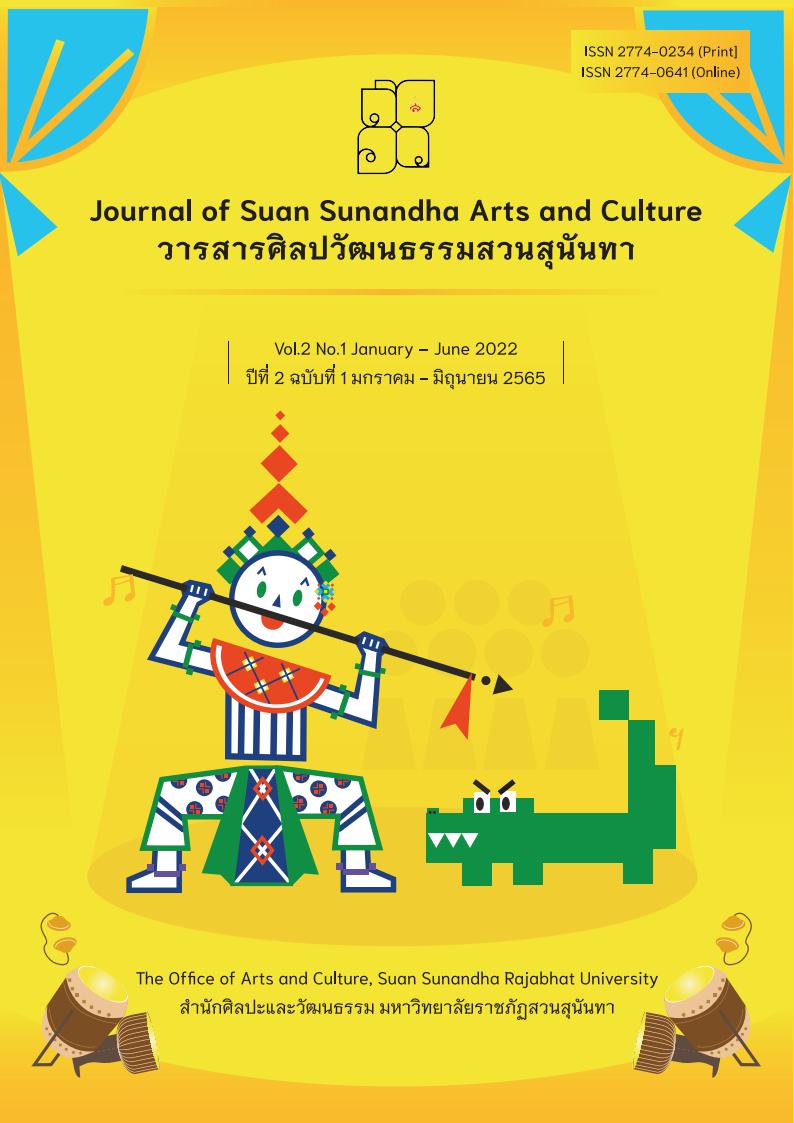EFFECTS OF USED "TAKUAPA OLD TOWN MODEL" ON CULTURAL TOURISM MANAGEMENT BY COMMUNITY
Keywords:
Takuapa Old Town Model, Cultural Tourism Management, Community Based Tourism ManagementAbstract
This research article discusses the effect of using “Takuapa Old Town Model” towards the management of cultural tourism by the community using the concept of cultural tourism and community based on tourism. including the concept of supplementary cultural capital as well Use a qualitative research methodology. The study target group, namely the Tourism Management Committee of Talat Yai Community and Senanuchrangsan Community, consisted of 32 people, using the Cultural Tourism Management Assessment Form before and after the operation. coupled with creative group meetings In-depth interview, observation, quantitative data analysis using R program to find the mean. and independent test values and analyzing qualitative data with content analysis. The results showed that The results of cultural tourism management evaluation after the operation in all 4 aspects were significantly higher than before the operation. The direction of cultural tourism management has been improved, namely 1) appropriate and better management of the area in terms of the transportation system arrangement. Safety and tidiness 2) Upgrading tourism programs that are appropriate and in line with the needs of each group of tourists 3) Develop Land Mark and interesting check-in points that convey stories of places that once prospered in the past for tourists to see through stories and 4) there are cultural learning resources that enhance knowledge and understanding of the history of the place get to know Takua Pa in a new perspective.
References
ธนภูมิ อติเวทิน. การจัดการทรัพยากรทางวัฒนธรรมเพื่อส่งเสริมกํารท่องเที่ยว ภายใต้บริบทของการพัฒนา. วารสารวิชาการการท่องเที่ยวไทยนานาชาติ, 13(1), 2560, 33-56.
บุพชาติ ดวงดี. รูปแบบการพัฒนาการเพื่อขับเคลื่อนการท่องเที่ยวแบบบูรณาการอย่างยั่งยืนของจังหวัดนนทบุรี. วารสารมนุษยศาสตร์และสังคมศาสตร์ มหาวิทยาลัยมหาสารคาม, 36(6), 2560, 228-227.
สกาวรัตน์ บุญวรรโณ. ย้อนอดีต มองปัจจุบัน กำหนดอนาคต: ทิศทางการจัดการท่องเที่ยวเมืองเก่าตะกั่วป่าผ่านการมีส่วนร่วมของชุมชน. วารสารวิชาการเครือข่ายบัณฑิตศึกษามหาวิทยาลัยราชภัฏภาคเหนือ, 10(2), 2563, 127-140.
Ife, J. Community Development: Creating Community Alternatives - Vision, Analysis And Practice, Addison Wesley Longman, Melbourne, Australia,1996.
Lipe William D. Value and meaning in cultural resources. Great Britain, 1984.
McManamon, et al. Using Values to Manage Archaeological Resources at a Landscape Scale. Advances in Archaeological Practice 4(2), 2016. 132–148.
McNiff, J. Action Research, Principles and Practice. London: MacMillan Education, 1988.
Musavengane, R. Using the systemic-resilience thinking approach to enhance participatory collaborative management of natural resources in tribal communities, 2019.
Newell, R. and Picketts, I. Spaces, places, and possibilities: A participatory approach for developing and using integrated models for community planning. City and Environment Interactions 6, 2020, 100040.
Pieterse, J. My Paradigm or Yours? Alternative Development, Post-Development, Reflexive Development. Development and Change 29, 1998, 343-373.
Stettner, A. C. Commodity or community? Sustainable development in Mountain Resorts, Tourism Recreation Research, 18(1), 1993, 3-10.
Downloads
Published
How to Cite
Issue
Section
License

This work is licensed under a Creative Commons Attribution-NonCommercial-NoDerivatives 4.0 International License.
วารสารศิลปวัฒนธรรมสวนสุนันทา เป็นวารสารในรูปแบบเปิด (Open Access) ผู้ใช้ทั่วไปหรือระบบสารสนเทศของหน่วยงาน ฐานข้อมูลอัตโนมัติ ระบบห้องสมุดอัตโนมัติ สามารถเข้าถึง ดาวน์โหลด เอกสารไฟล์บทความบนเว็บไซต์วารสาร โดยไม่มีค่าใช้จ่ายแต่อย่างใด
ข้อความภายในบทความที่ตีพิมพ์ในวารสารศิลปวัฒนธรรมสวนสุนันทาทั้งหมด รวมถึงรูปภาพประกอบ ตาราง เป็นลิขสิทธิ์ของสำนักศิลปะและวัฒนธรรม มหาวิทยาลัยราชภัฏสวนสุนันทา การนำเนื้อหา ข้อความหรือข้อคิดเห็น รูปภาพ ตาราง ของบทความไปจัดพิมพ์เผยแพร่ในรูปแบบต่าง ๆ เพื่อใช้ประโยชน์ในเชิงพาณิชย์ ต้องได้รับอนุญาตจากกองบรรณาธิการวารสารอย่างเป็นลายลักษณ์อักษรอนุญาตให้สามารถนำไฟล์บทความไปใช้ประโยชน์และเผยแพร่ต่อได้ โดยอยู่ภายใต้เงื่อนไข สัญญาอนุญาตครีเอทีฟคอมมอน (Creative Commons License: CC) และ ต้องแสดงที่มาจากวารสาร – ไม่ใช้เพื่อการค้า – ห้ามแก้ไขดัดแปลง, Attribution-NonCommercial-NoDerivatives 4.0 International (CC BY-NC-ND 4.0)
ข้อความที่ปรากฏในบทความในวารสารเป็นความคิดเห็นส่วนตัวของผู้เขียนแต่ละท่านไม่เกี่ยวข้องกับสำนักศิลปะและวัฒนธรรม มหาวิทยาลัยราชภัฏสวนสุนันทา และบุคลากร คณาจารย์ท่านอื่น ๆ ในราชวิทยาลัยฯแต่อย่างใด ความรับผิดชอบองค์ประกอบทั้งหมดของบทความแต่ละเรื่องเป็นของผู้เขียนแต่ละท่าน หากมีความผิดพลาดใด ๆ ผู้เขียนแต่ละท่านจะรับผิดชอบบทความของตนเอง ตลอดจนความรับผิดชอบด้านเนื้อหาและการตรวจร่างบทความเป็นของผู้เขียน ไม่เกี่ยวข้องกับกองบรรณาธิการ



